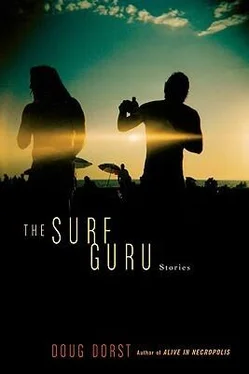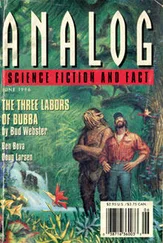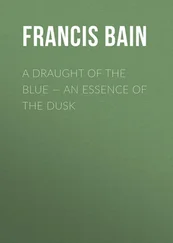“Nobody loves me,” he said. He slumped in his seat and lit another cigarette.
“Tell you what,” I said. “If any of these people turn out to be dead, I’ll save their flowers for you.”
“Let me see the names,” he said. I handed him the clipboard. He read the names aloud, then sucked on his cigarette thoughtfully. “Popovich is the one,” he said. “My money’s on Popovich.”
The van bumped over frost heaves left by the hard winter. We drove past the high school we’d gone to — I’d graduated, he’d been kicked out — and we drove through the double-S turn that killed our friend Crockett while Trace and I were passed out in his backseat. We drove past the golf course where we’d both gotten laid for the first time, up on the thirteenth green, which on clear nights had a view of Manhattan. We drove past the house my parents had to sell when they split up for the first time, and past a marsh where Trace and I had rescued an injured heron when we were little. It was strange, I thought, how much of our lives you could see from this one road.
“You missed some action at the bar last night,” Trace said.
“Was Katie there?” She’d left me, and I was avoiding her.
“She was,” he said. “She called you a useless fuck.”
“Which way did she mean that?”
“Whichever way is worse. She was pretty hostile.”
“She’s a hostile person.” The night she left, she’d thrown her shoes at me, and I threw them out the window. She walked away barefoot. She wanted to go that badly. Her feet were salmon-pink under the streetlights.
“This is one way we’re different,” Trace said. “I need Mo. You do better alone.”
“That’s not true,” I said. I didn’t want it to be true. It was April and warming up, and the smells of the wet piney morning and the flowers in the van made me feel like possibility was in bloom.
The hospital was a concrete tower the color of good teeth. While Trace finished another cigarette — for all he knew, he said, it could be his last — I took the metal cart out of the back of the van and loaded it. Most of the orders were Smiley Healthy Wishes arrangements. The glass doors of the hospital swung open, and we walked in together: Trace, the patient, about to receive a plastic miracle in his head, and me, the messenger of hope.
“Thanks again,” he said. “Mo will pick me up when it’s over.”
“Do you know that for sure?”
“How much grief counseling could those girls need?”
“They’re at-risk,” I pointed out.
“Fuck,” he said, “aren’t we all?”
That made a certain kind of sense. “Good luck with your eye,” I said.
“I don’t need luck,” he said. “What I need is less trouble.”
It turned out none of my people were dead. Mr. Popovich did look pretty bad. He was groggy and his room smelled like creeping fear, but he was still breathing away. His sunken eyes tracked the shiny Mylar balloon that came with his flowers. You could tell he liked the way the sun was shimmering on its surface. I spun the balloon a few times so he could watch it send disco-ball lights sweeping over the walls.
After that I delivered Smiley Business Is Blooming! baskets to all the suites in the office park out on 128, a Merci! Bouquet to an overperfumed real estate agent, and a cross made of white snapdragons and daisies to the funeral home. In the parking lot behind the funeral home, I shared a bent, skinny joint with a guy I knew called Black Swede, who worked there keeping the carpets clean and the bathrooms sparkling for the grief-stricken. My last stop on the morning run was at a gated estate up on Whippoorwill Road, where I brought fresh irises to a gray-haired lady who was wearing yellow gloves and polishing her silver. She told me she was hosting a prayer group dinner that night, and I guess I said that was nice. She tipped me a twenty that she slipped inside a glossy pamphlet. On the cover, in red block letters, it said, WHAT IS MINE WILL KNOW MY FACE.
“Do you understand the title?” she asked me.
I considered. “Does it mean that things work out in the end?”
“In a way,” she said. “As long as you believe.”
She waved from her window as I backed the van down her narrow driveway. She was still wearing her rubber gloves.
I pulled into the parking lot behind Smiley’s just before noon. The store was sandwiched between a beauty salon and a Chinese restaurant, and by that time of day the air stank of burned hair and fried food. I rolled up the windows in the van, so that the flower smell would stay in. One of the Chinese waiters was outside feeding scraps to a skinny gray cat. I yanked open the steel door, freshly tagged with some word I couldn’t make out, and sat at the workbench in the back room.
Smiley was at the counter with a customer, a tall girl in her mid-twenties, a vision of summertime two months early. She wore a white sundress and had a store-bought tan that made her look orange. She was crying, and Smiley was talking to her softly. His words were lost to me in the refrigerators’ hum, but when he walked her to the door, she hugged him. Smiley was smooth. He knew the things to say.
Smiley came into the back room and tossed a dozen red roses onto the workbench. “Now, that was a sweet girl,” he said. “Nice-looking, too. I’d tell you to chase after her if I didn’t think you’d fuck her up even worse.”
“She was orange,” I said.
“Nice attitude,” he said. “One of many reasons you’re not getting laid.” He opened a cabinet, took out a can of black spray paint, and flipped it to me.
“You want me to kill these flowers with paint?”
“They’re cut,” he said. “They’re already dead.”
“But what’s this about?”
He spread his arms wide. “It’s about love,” he preached. “Love and desire and jealousy and hurt feelings and orgasms that make your ears ring for days and resentment and bliss and painful but treatable infections and comfort and yearning and our inevitable exposure as the fickle, craven frauds we all are.”
I shook up the paint can and aimed the nozzle at him. “Are you done?” I said.
“Of course, that’s just one school of thought,” Smiley went on. “There’s another that says it’s just about some dick-head named Chip who got caught screwing someone he shouldn’t have.”
The front door chimed open with the first notes of “Edelweiss,” and Smiley went to help the customer. I picked up a rose, wrapped a paper towel around the top of the stem, and sprayed in short bursts while I spun the flower slowly in my hand. Then I rained black on it from above, aiming into the folds where I could still see slivers of secret red. I watched from inside a sweet cloud of fumes as color turned into slick, inky black and paint clogged the soft petals, puddling where I’d oversprayed. I laid the roses to dry in a straight line down the edge of the bench. Twelve dead soldiers. My fingers were covered in paint. I should have thought to wear gloves.
I walked out front, where Smiley was misting the tulips. I was feeling spin-headed and a little numb. I wiggled my black fingers at him like a cartoon wizard. “Fear me,” I said. “I am evil.”
He snorted. “You wouldn’t know evil if it crapped in your mouth. Now go clean your hands before you get paint all over my store.”
The paint wouldn’t come off. I scrubbed and scrubbed, but I was marked.

Business was slow, as usual. Smiley’s ex-wife Charlotte had opened up her own flower shop a few blocks away, just to ruin him. Smiley was fighting back — he undercut her prices, had his friends phone in fake orders, put sugar in her delivery van’s gas tank. Neither place was doing very well. People could sense that both were trading in spite.
Читать дальше













